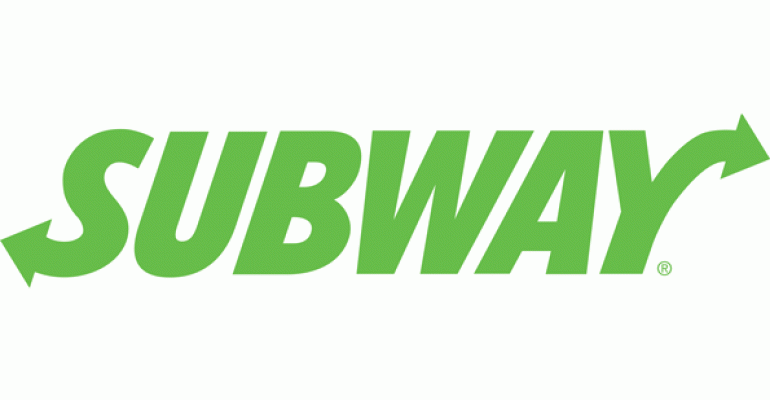The U.S. Department of Labor’s Wage and Hour Division has reached a voluntary agreement with Subway in which the franchisor will work with its operators to ensure they pay their workers fair wages, the department said Monday.
The deal was described as the “first of its kind” between the department and a franchisor, in which both the Department of Labor and Subway will work to educate franchisees on wage and hour laws.
The cooperative agreement will increase franchisees’ compliance with labor laws while “helping us to ensure that workers get paid the wages to which they are legally entitled,” division administrator David Weil wrote in a blog on the Department of Labor website announcing the agreement.
“Our work with Subway breaks new ground in how we can work with the regulated community — not only with employers, but with franchisors, suppliers, retailers and others — to channel their influence to ensure that all employers along a supply chain or otherwise linked in commerce play by the rules,” Weil wrote.
In a statement, Subway said: “As a franchisor, we want to do all that we can to build a socially responsible brand. The education and resources provided by the Wage and Hour Division can only benefit the franchise community. When franchisors better understand and follow the law, it helps them maintain loyalty with their staff and decreases the risk of lawsuits.”
But the agreement quickly came under fire from business organizations that said the deal will make Subway vulnerable to rules from another federal agency: the National Labor Relations Board.
The International Franchise Association said in a statement that the agreement and efforts to educate franchisees about labor laws are complicated by the NLRB’s new joint-employer standard, which makes franchisors liable for the employment decisions of franchisees.
“Legitimate concerns now exist as to which franchisor actions cross the line and could serve as evidence of a joint employment relationship in future litigation or a government enforcement action,” Elizabeth Taylor, IFA vice president of government relations and general counsel, said in a statement. “Without assurance that their compliance efforts will not be used against them by another government agency, or plaintiff attorneys, franchisors are caught in an inevitable catch-22.”
Trey Kovacs, a policy analyst for the free-market policy group the Competitive Enterprise Institute, said in an interview that one provision in the Subway agreement is “eerily similar” to a provision the NLRB targeted in calling McDonald’s a joint employer.
That part of the agreement involves Subway using technology to help franchisees comply with labor laws. The NLRB used McDonald’s software making recommendations on wages and hour and on hiring and firing as evidence of its role in its franchisees’ employment decisions.
The NLRB has said little since its ruling in the case against Browning-Ferris Industries last year established a new joint-employer standard, Kovacs said. That has made the environment for franchisors and other companies uncertain — meaning even well intentioned steps like this one could be seen by the board as evidence the company exerts some control over franchisees’ workers.
“What the agreement with the Department of Labor does is it forces Subway to exert more control over franchisees,” Kovacs said. “It’s very possible the kind of control their taking” could leave it vulnerable to the joint-employer standard.
The Department of Labor said that the agreement does not put Subway in any danger of being labeled a joint employer — at least when it comes to the Department of Labor. “Nothing in this agreement increases or decreases the likelihood that Subway could be held as a joint employer in an investigation into [fair labor standards act] violations by a franchisee conducted b the wage and hour division,” the department said in a statement. But, it said, “The NLRB is an independent agency and its decisions are based on a different statute.” Federal regulators say the restaurant industry has “significant” problems complying with wage and hour laws. The Labor department found that the industry owed more than $38 million in back wages for nearly 47,000 restaurant workers.
The department has been working to ensure compliance by reaching agreements at the very top of the food chain, in this case Subway, which has 26,000 U.S. locations, making it the country’s largest restaurant chain by unit count, according to Nation’s Restaurant News Top 100 data.
The department and Subway have, in fact, been working together since 2012, with the Wage and Hour Division staff appearing at annual meetings, and Subway publishing articles from the department in its newsletter. The agreement between the two builds on that collaboration.
Under the agreement, Subway will help the department develop compliance assistance materials and will distribute them to operators. The two will also work to use technology to help operators comply with wage and hour laws and have committed to regular meetings and communications to improve compliance.
“We realize that this relationship is a first of its kind and unorthodox in its nature, but we are committed to making available a platform for the Department of Labor to provide training and resources to independent franchise owners to ensure they have the tools necessary to comply with wage and hour laws,” Subway said in a statement.
Contact Jonathan Maze at [email protected]
Follow him on Twitter: @jonathanmaze
UPDATE: Aug. 3, 2016. This story has been updated to add reaction from the US Department of Labor’s wage and hour division.




